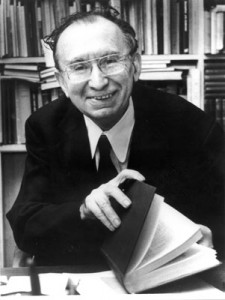ITALIAN PORTAITS Arnaldo Momigliano, a Life for Historiography
“Historians are supposed to be discoverers of truths,” this simple adage by Arnaldo Momigliano can help us understand his drive to investigate the history of the ancient world.
Momigliano was an Italian Jew, which already gave him a unique view on the world. The Jewish communities of Italy are diverse and distinctive at once, having undergone countless indignities through the centuries, and yet persevering. Momigliano is a case in point, because he did not let the oppression and racism that would eventually lead to the devastation of the Holocaust impede his stellar career as a writer of historiography.
Arnaldo Momigliano was born in 1908 at Caraglio, a small town in Italy’s northwestern Piedmont region. Unlike most Italian Jews of his generation, he was raised in a religiously observant household, and received a traditional Jewish education along with his public school and university education. At the young age of twenty-seven he won the prestigious chair in Roman History at the University of Turin. However, his position there lasted less than two years: he was fired from his post in 1938 when the Italian Racial Laws went into effect, prohibiting Jews from teaching or studying in any state institution. At this dark hour, Momigliano seized the opportunity to move. He escaped persecution by fleeing to England where he did research at Oxford University and taught ancient history at University College in London. In Britain he was able to teach freely while keeping a safe distance from the Fascists, and later, the Nazis.
Although he was not living in Italy, he did not abandon the Italian Jewish community. Some question whether his move effectively constituted a desertion of people in their hour of need. Others argue that his self-preservation was a reflection of his passion for his studies, his dedication to teaching, and his religious freedom. He remained in England after the war teaching at University College until 1975.
Momigliano was a leader in the field of historiography, and still ranks among the most influential and respected scholars of ancient historiography. He did not simply present one-sided arguments or over-simplified lessons as are often taught in history books. Instead, Momigliano asked questions and discovered new truths. The methods developed by Momigliano of inquiry into the past have been influential to historians from different fields and through generations. He reminds us that there are always more questions to ask and more ways of understanding historical truth.
*Lauren Waldman is a student at Muhlenberg College (Allentown, Pennsylvania, USA).

